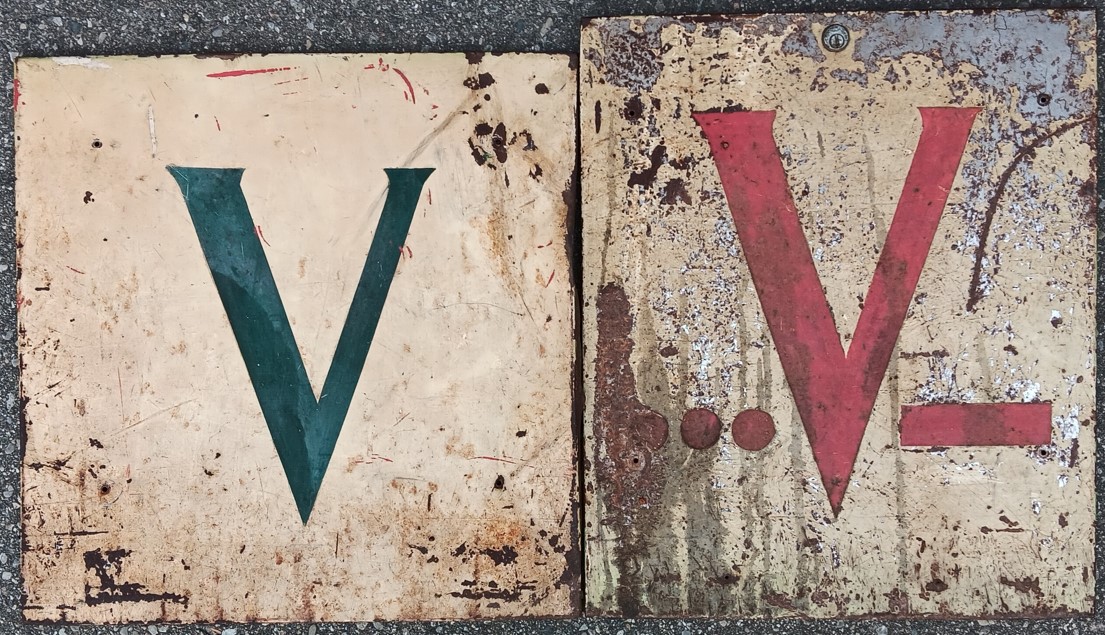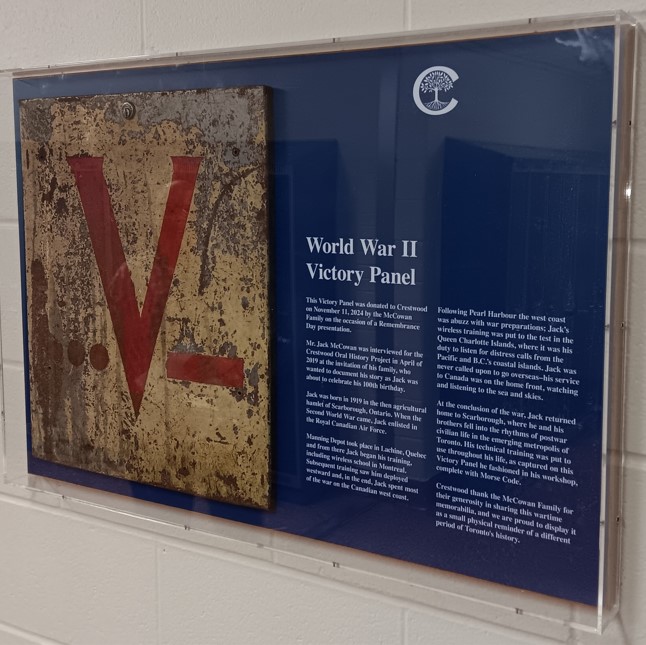Community
Studies: Publications
Victory in Europe
James Alexander McCowan started a vending machine business in the mid-late '50s. He stored some old cigarette machines in the shop above the McCowan driving shed on Kingston Road. One of the cigarette machines had a prominent label -- "No Sunday Sale". Not exactly sure how that edict was enforced!
Jim's brother, William David McCowan, was very good at re-purposing just about anything. One of his mid '60s homemade table saws needed a couple of panels to keep at least some of the wood-dust under control. "These things fit close enough". He took the front and back panels off one of the early-mid '40s cigarette machines -- "V" for victory in Europe..
Here they are on the floor, getting cleaned up a touch in time for donation by the McCowan family to Crestwood Academy on Remembrance Day 2024.

The sound for the letter “V” in morse code – short, short, short, long – was used by the BBC to begin their war-time radio broadcasts.

"V" for Victory
Now Mounted on a Hallway Wall at Crestwood
Crestwood Academy Oral History Project
Bill McCowan was in the RCAF, as were his older brothers, Bob and Jack. Jack was interviewed in 2019 by Crestwood Academy for their amazing and very extensive Oral History Project. Crestwood also has an interview with Bob posted at McCowan, Bob – CRESTWOOD. Many of Bob's wartime letters are posted alongside his video.
In 2025, two Crestwood Academy students received nice cash awards for their essays based on world war 2 recollections in the Crestwood Oral History Project. These awards were under the Jack McCowan History Award.
**************************************
As terrible (and oftentimes pointless) as most wars are, there have been many occasions in history when freedom, sovereignty and social justice could only be preserved by taking decisive action against aggressive despots, dictators, warlords and other invaders. Many, like Robert James Stobo, made the supreme sacrifice.
In Flanders’ Fields
Was Written
By Lieutenant Colonel John McCrae
A Distinguished McCowan
Ashley McCowan worked hard in Scarborough’s fields. Farmers were needed on the home front to keep the war-effort support economy going, so he was initially exempted from war service. The letters of his older sister, Ruth, afford us glimpses of the daily and not-so-daily routine on the McCowan farm during the war years. Here are a few extracts from Neigh the Front--Exploring Scarboro Heights.
Ashley went in and signed up and was examined. He is in A2 which means fit in every way without military training. A1 is fit with military training. So we don’t know whether he will be called up to go or not, but think probably he will. They are leaving one man on every hundred acres. So likely they will consider Harold and Papa enough to work this farm. It falls pretty heavy on the ones that are left. I can tell you the three of them worked very hard all summer.
October 28 1917
Ashley has been exempted until the second draft is called. I think all of the farmers are left until the married men are called.
November 20 1917
Ashley has to go before a judge in a couple of weeks. Nearly all the boys around here have to go to train in November, even those who are all alone on the farm like Harry Morgan, Jim Bell, Allan Green, Will D. Thomson. While other whole families are left because they happen to be over the age limit, like McKeans. They have six boys, five at home. Isn’t it absurd?
July 14 1918
Papa is a judge in the standing crop competition this year and is away to Bobcaygeon for the rest of this week, so we are running this ranch all by ourselves. Ashley has decided to enlist as soon as the harvest is in. I think he is thinking of trying to get into the mechanical part of something, perhaps the Flying Corps.
July 31 1918
Casualties are very heavy, seven columns in last night’s paper. There were two McCowans in the list one day, one from Manitoba, the other from Edmonton. I was wondering if he would be the tailor from Banff.
August 28 1918
Evidently aware of other McCowans in Canada, and known to be keen about the family background, perhaps Ruth knew that the McCowans of Banff were no relation. These McCowans had immigrated from Perthshire, Scotland, whereas Ruth’s great grandfather, James McCowan, had been born in New Cumnock, Ayrshire. The list of casualties several months earlier had indeed included one of her distant McCowan cousins. Did Ruth know that Lieutenant Colonel John McCrae of Guelph, the famous author of "In Flanders Fields", was descended from the McCowans of Cumnock, as was she? Perhaps...
John McCrae was born in Guelph, Ontario, on November 30 1872. His great-great-great grandparents were John McCrae, 1749-1827, and Jean McCowan, possibly daughter (born 1749) of David McCowan, wright in Ochiltree. This godly couple were strong supporters of the early dissenters in the Church -- they frequently opened their New Cumnock home to the preachers of the secession. Their grandson, David McCrae, 1800-1878, came to Guelph in 1849 with his eldest son, Thomas. Born in 1820, Thomas became one of Guelph’s leading industrialists and businessmen -- in lumbering, woollen works and beef exports. At one point his mills employed 300 local people. Thomas’ son, David, later managed the firm, McCrae and Company. David and his wife, Janet Eckford, had three children -- the famous poet, John, being the second son. The values of John McCrae were partly shaped by the impact of the Lowland Clearances on his ancestors.
John McCrae was educated at Guelph Collegiate and the University of Toronto where he received his B.A. in 1894. He was later appointed a Fellow in Pathology at McGill University and wrote several medical texts as well as short stories. This physician and author was also a militarist, commanding a section of the Royal Canadian Artillery during the Boer War, 1900-1901.
Shortly after war was declared in 1914, McCrae enlisted as a surgeon in the Canadian Field Artillery. He was inspired to write "In Flanders Fields" on May 3 1915 after performing the funeral service of a friend.
In January 1918, while second in command of medical services at Number 3 General Hospital in Boulogne, McCrae contracted pneumonia. He died on January 28 1918.
Quoted at hundreds of Remembrance Day services the world over every November 11 at the eleventh hour, "In Flanders’ Fields" is undeniably the most well-known literary work about war.
In Flanders’ Fields
By John McCrae
In Flanders’ Fields the poppies blow
Between the crosses, row on row,
That mark our place; and in the sky
The larks, still bravely singing, fly
Scarce heard amid the guns below.
We are the dead. Short days ago
We lived, felt dawn, saw sunset glow,
Loved, and were loved, and now we lie
In Flanders’ Fields.
Take up our quarrel with the foe:
To you from failing hands we throw
The torch; be yours to hold it high.
If ye break faith with us who die
We shall not sleep, though poppies grow
In Flanders’ Fields.
Ruth McCowan Heron letters
A Cyclopæedia of Canadian Biography
McCrae House Museum in Guelph -- well worth a visit!
The McCowans' Who's Who, Vol. 11
The Scarboro Heights Record V10 #10*************************************************
Newsflash!
World History students are invited to participate in a World History Essay Competition.
One theme that students could follow in their essay is the evolution of the value system of John McCrae, a distant relative of the McCowans of Scarborough. To get started, please refer to these pages:
Why the lowland clearances were -- and still are --
important to Canada's socio-economic development.World History Essay Competition Overview -- Your Community in a World History Context.
Competition entry form and related info.The Lowland Clearances
Introductory and reference material.
See also the many linked pages for more potential input information to your essay.Please refer to the many positive reviews of our various projects on our reviews page. Our methodology for using Community Studies as a catalyst for teaching information processing begins on our Subject Index and Educational Resource page.